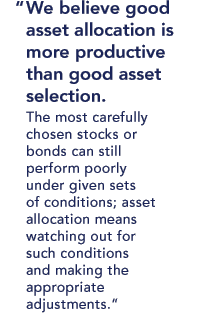

  |
 |
|
 |
 |
The five major assets and the need to allocate among them Asset allocation at its simplest means putting more money in types of assets which are favored under the conditions seen to be developing and taking money away from assets which are expected to be in disfavor. The five major investment assets: Cash, Stocks, Bonds, Real Estate, and Tangibles, such as precious metals are subject to large-scale shifts in relative value caused by certain broad and powerful forces, primarily: economic expansion or contraction, the tendency toward inflation, disinflation or deflation, the financial polices of the leading industrial nations, and major political and legislative changes. The effect of these forces on asset values can range from mild to very strong and they profoundly impact portfolio performance. At first, they exert little influence and take a long time to build up before values are affected noticeably. Plenty of evidence of their existence is present along the way. However, the time lag between the evidence and the value changes often masks the cause-effect relationship, so that many asset owners do not sense the need to re-allocate investment assets. Instead, they stay exposed to declining values or fail to move into asset types that will be favored under the newly unfolding condition.
Who should make asset allocation decisions? The traditional investment advisor? Selecting stocks and bonds is an exacting task, usually carried out by a staff of highly paid analysts applying standard techniques and varying degrees of insight to sorting out relative values. However, questions of absolute value are more vital: whether stocks are attractive at all and whether bonds are, and in what proportions should they be owned? This requires a different thought process and set of skills. Therefore, it is often sensible to have the tasks performed separately. We believe good asset allocation is more productive than good asset selection (although each is important). This is because the most carefully chosen stocks or bonds can perform poorly under given sets of conditions, while the essence of asset allocation is to watch out for such conditions and make the appropriate adjustments. Although certainty of success is never possible in choosing an asset allocator, it is sound logic, at least, to assign the responsibility to those who have appropriate credentials and who are focused on the subject all the time.
No-load mutual fund building blocks permit flexible asset allocation and more Alpha’s management costs are moderate in comparison with industry norms. Custodial fees are eliminated; transaction fees are eliminated as well.
While the mutual fund researchers and analysts concentrate on searching for opportunities in individual stocks and bonds, Alpha is free to concentrate its efforts in another direction: Analyzing and understanding what is occurring in the economy and the investment markets– and applying that understanding to a rational allocation of portfolio assets. |
|